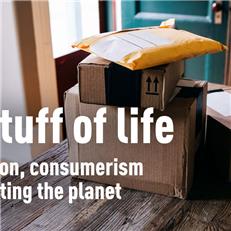The Stuff of Life: New SUEZ report sets out asks of government to reduce consumption and help households reduce expenditure
- UK consumption is responsible for emissions of around 800,000 tonnes of CO2eq per year
- Between 60 to 80% of impacts on the planet come from household consumption
- UK consumers buy more new clothes than any other European country and throw away over one million tonnes per year
We are living in a period of mass consumption. As a major economy, the UK’s production and consumption has made it the fifth-largest contributor to greenhouse gas emissions in the world . The "Stuff of Life” report, commissioned by SUEZ recycling and recovery UK and conducted by Beasley Associates, sets out a roadmap to address the issues caused by consumerism - outlining interventions for businesses and the public sector to tackle over-consumption.
Between 60 to 80% of impacts on the planet come from household consumption. As the new UK government considers its priorities for the coming year, it has a chance to consider policy that can address this growing issue – helping to conserve energy and, ultimately, reduce household bills at a time of rising costs.
The “Stuff of Life” sets out a plan of the measures policy makers at local and national level can take to support people in reducing their consumption. Government policies that promote refills and reuse are an integral step to minimising excess waste. These measures are already operating successfully across Europe, in France, Spain and Austria, where ‘refills’ in supermarkets are becoming commonplace.
In addition to this, an extension of the single use plastic ban to other single use items, such as wrapping on fruit and vegetables, will reduce waste for businesses. The UK government has banned plastic straws, stirrers, and cotton buds, but SUEZ’s recent report shines light on why this policy must be expanded to other single use plastics if we are to successfully eliminate unnecessary waste.
With UK consumers buying more new clothes than any other European country, and throwing away over 1 million tonnes per year, businesses also hold responsibility when it comes to our consumption habits. Within the report, SUEZ calls on businesses to review their business models to reduce unnecessary over consumption, for example mainstreaming alternative services including subscription and rental options to reduce fast fashion.
Commenting on the report, John Scanlon, CEO of SUEZ, said: “Our latest report highlights the role overconsumption has in negatively impacting our environment. We need to make a collective effort if we are to effectively make a difference.
“It is not just the responsibility of the consumer, action from governments around the world is needed to ensure consumption-based emissions are included within climate targets.
“Businesses also hold significant responsibility when it comes to this growing issue and need to step up and update their models to reduce unnecessary consumption and waste.”
Other steps we can take to reduce overconsumption include:
- Provide fiscal incentives to encourage reuse, repair and renovation
- Set targets for percentage of reuse required and provide policy support to address high start-up costs
- Work with licencing, trading standards and environmental health teams to identify barriers to reuse / refill schemes
- Remove the best before dates on appropriate items to reduce food waste, with M&S and Waitrose already starting to scrap these dates

